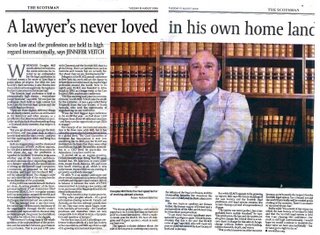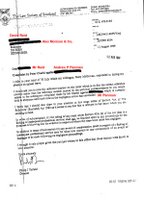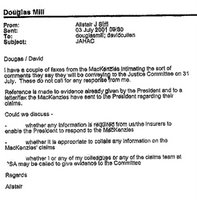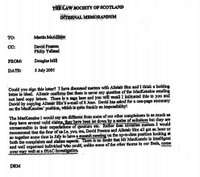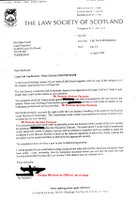After a recent story in the Scotsman newspaper, reporting that some 250 lawyers were to have their records 'wiped clean' over what appears to be an organised misuse of regulatory powers, clients whose cases have been affected in this affair, where verdicts such as "unsatisfactory conduct" were applied to solicitors after complaints had been investigated, have now called on the Law Soceity to reinvestigate their complaints, and apply different sanctions other than what was initially, perhaps, conveniently, imposed after what turned out to be in many cases, prolonged, prejudicial, and prevaricative investigations against member legal firms and solicitors by the Law Society of Scotland.
You can read the original article from the Scotsman, here : http://thescotsman.scotsman.com/scotland.cfm?id=1239022006
and my original coverage of the story at :
http://petercherbi.blogspot.com/2006/08/law-society-of-scotland-finds-new-ways.html
The origins of the affair started in January 2003, when the Law Society, obsessed with dressing up self--regulation as the best thing since sliced bread, and trying to maintain it's own power over legal issues, started applying the "unsatisfactory conduct" verdict on lawyers records, in an effort to argue it was doing something to combat soaring client complaints - but being aware all the time, there needed to be legislation approved to make this so, as is reported in the Scotsman newspaper article.
So, why did the Law Society of Scotland not drag out the likes of David Mcletchie, Roseanna Cunninghan, Donald Gorrie and Pauline McNeill, who sponsored the "Council of the Law Society" Bill on 6 September 2002, to bring in yet another piece of legislation to allow them to do this ?
Well, as we all know, nothing happens in the Scottish legal profession, without some foresight as to it's effect .. and given the fact that some of these 250 lawyers were involved in very serious complaints, which also had seen the involvement of senior Law Society staff in allegations of fiddling the complaints .. one many speculate, with good reason, the matter was left to rest, so that the Law Society, at some later date post January 2003, could simply remove the verdict .. and blame it on the political process, for not providing the necessary legislation to effectively carry out the sanctions process .. and what do we have now ? exactly that.
You can see a copy of the Council of the Law Society of Scotland Bill on the Scottish Parliament's own website, at http://www.scottish.parliament.uk/business/bills/billsPassed/b60as1.pdf
and you can read more about the Council of the Law Society of Scotland Bill, at : http://www.opsi.gov.uk/legislation/scotland/acts2003/20030014.htm
Isn't it strange, the Law Society of Scotland can get what legislation it wants through the Scottish Parliament, with politicians who are also lawyers, at almost the speed of light ? but members of the public including clients who have had their livelihoods and lives ruiined by the legal profession, have to wait years for results to their calls for Parliamentary debate ?
As a campaigner myself, I went to the Scottish Parliament in 1999, and asked the then Justice & Home Affairs Committee - which was then under the Convenership of Roseanna Cunningham, to hold an investigation into the Scottish legal profession and how it was regulated. Several other clients who had problems with the likes of the Law Society of Scotland, Faculty of Advocates, and other parts of the legal profession, joined me, and we had the Scottish Consumer Council 1999 report - "Complaints against Solicitors", as good evidence to support our case. In what became bitter exchanges between clients, campaigners, the Parliament itself, and some particularly nasty Parliamentary Clerks, who embargoed particular campaigners from even communicating with the Committee on such matters, the Justice & Home Affairs Committee voted to do nothing.
Not to give in to failure, the campaign to get a Parliamentary investigation into the thoroughly corrupt Scottish legal profession, moved on, with the formation of groups such as "Scotland Against Crooked Lawyers', and saw other campaigners joining together in efforts to get an inquiry.
In February 2001, the newspaper, Scotland on Sunday, in an article by the then Chief Reporter - Peter Laing, ran a story on my own case, and reported that my MSP, Phil Gallie, had got us the chance to have an investigation into regulation of the legal profession by the Justice 1 Committee of the Scottish Parliament, of which Phil Gallie was a member, the Committee being chaired by Christine Grahame .. and having some of the present members of the Justice 2 Committee .. the likes of Maureen McMillan - who, at the time, was married to a senior member of the Law Society of Scotland's "Scottish Parliament liason Committee" ...
I was then invited onto BBC Radio to debate problems with the Scottish legal profession, what happened in my own case, and what form the Parliamentary inquiry in 2001 might take with lawyers Joseph Platt (who went on to become Law Society President that year) and Austin Lafferty, the infamous media lawyer, who declared the perfect client to be an old lady who came along to sell her house for £100,000 ....
I covered the story of the BBC Radio debate in my earlier post here : http://petercherbi.blogspot.com/2006/03/bbc-radio-scotland-debate-on-legal.html
The Justice 1 Committee inquiry started in 2001, amidst the high hopes of clients & campaigners like myself - but when Mr Gallie began to ask sharp questions on why there were constant protests against the legal profession when it was claimed all was well with regulation of solicitors, he was replaced by his own party on the Committee ... limits were then also imposed on who would be able to speak before the 2001 Justice 1 Committee ... (no individual clients were allowed to appear) .. and the submission from members of the public who had been maliged by crooked lawyers - and an even more crooked Law Society of Scotland, were heavily edited, to the point that some submissions simply did not make sense. A strong line was also taken by the then Justice 1 Committee, against the appearance, of "Scotland Against Crooked Lawyers", in an orchestrated attempt by some in the Parliament and legal profession to portray SACL as a rogue organisation, being irrelevant and 'against the public interest' ...
Ultimately, the "Regulation of the Legal Profession" inquiry by the Justice 1 Committee, launched in 2001, was used by the Scottish legal profession, to support it's position as self-regulator ... and it was hoped the outcome of the 2001 inquiry would put a stop to calls for reforms of the way complaints against lawyers were handled. No such luck !
Myself and the many other campaigners soldiered on to get the reforms to , through torturous Scottish Executive consultations and well organised dirty tricks campaigns by the legal profession, and a certain subjugated Scottish newspaper group, who once, supported independent regulation and featured my own case, and those of many others, heavily among it's pages .. and we eventually got the Justice 2 Committee Stage 1 Consideration of the "Legal Profession & Legal Aid" (Scotland) Bill, a long overdue piece of legislation we have been asking for nearly two decades ... to end the corrupt form of lawyer investigating lawyer and covering up for the crooked.
Along the way, certain people who were arrogantly opposed to transparency, and clients interests, such as David Mcletchie - a lawyer who hated the thought of independent regulation .. but fought bitterly to keep his taxi expense claims .. and some other 'aspects' of his social life, from becoming public .. were paid back for their obstructional tactics in support of their crooked comrades at Drumsheugh Gardens .. with some others still awaiting the chop over new evidence coming to light yet to be used ...
The Stage one debate on the LPLA Bill begins in the Scottish Parliament, next week .. and the stage 2 consideration of amendments will begin on 26 September 2006 ... and one of the amendments I am particularly interested in curtailing, is the attempt by the equally crooked Institute of Chartered Accountants of Scotland (ICAS) to insert an amendment so that accountants can handle the business of wills & probate, which at present, only a lawyer can do - thus giving the possibility that clients of accountants who get ripped off in the handling of a deceased loved one's affairs, will have to go through yet more self-regulatory channels at ICAS if they complain against their crooked accountant but clients of lawyers under the terms of the new LPLA Bill will have much greater protection in the form of independent regulation of lawyers by the new Scottish Legal Complaints Commission.
It will be interesting to see what happens in next week's debate on the LPLA Bill .. because as we all know, every single MSP in the Scottish Parliament, has had letters from constituents regarding problems with lawyers, problems with the Law Society of Scotland, problems with the Faculty of Advocates, and other areas of the Scottish legal profession. Many MSPs have made representations to the Scottish Executive (sometimes the same representations in different cases) to the Executive ... so will this be reflected in the debate ?
Will MSPs admit that, for the entire history of the Scottish Parliament, they have known of severe problems with the regulation of lawyers in Scotland ?
Will MSPs admit they have had thousands of constituents write to them over the years ? , on horrendous issues such as lives being ruined, businesses being ruined, homes being lost, families being harrassed, assets being embezzled, stolen, deceased love one's belongings and assets stolen - all at the hands of ... Scottish lawyers - who have been supported to the hilt, bu their corrupt self regulatory body - the Law Society of Scotland.
We shall have to wait and see what happens next week in Parliament, and at the Justice 2 Committee .. but while we wait ... let's call for those 250 lawyers names to be made public, along with the details of all those complaints - if the Scotsman were so quick to publish the 'muddle' story - they should publish the clients side of what happened - after all, we are talking about the public interest here, aren't we ?
